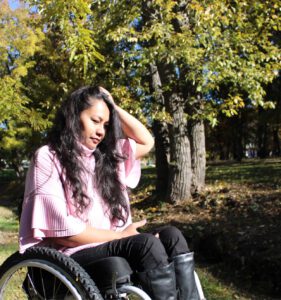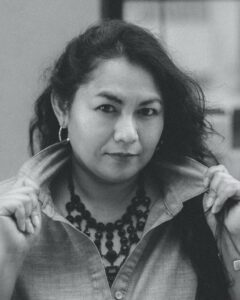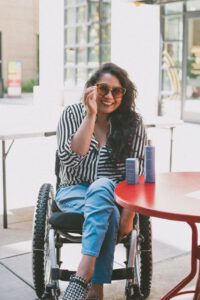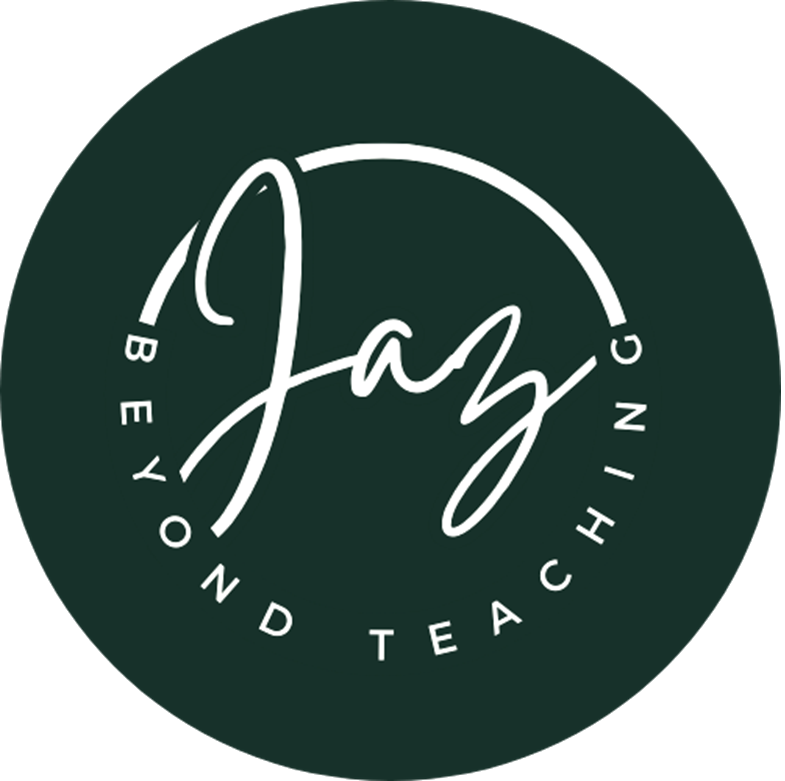I didn’t personally know Ymonette before this, but she came highly recommended by one of my previous featured person, Maila Rito – and after hearing even a part of her story, I immediately understood why. There’s a quiet strength in the way she speaks, and a wisdom that only comes from someone who has faced life-altering challenges and chosen to keep showing up – with grace, resilience, and a deep sense of purpose.
After talking with her over a video call, we hit it off right away – it felt like catching up with an old friend. We connected on so many levels, and I’m excited that we’ll even be working on some upcoming projects together. It’s amazing how shared experiences and honest conversations can build something meaningful, even across distance.
A Childhood Between Worlds
Born in Manila and raised for a few years in a small town in Ozamis, Mindanao, Ymonette’s early childhood was filled with the warmth and simplicity of provincial life. When her family migrated to Southern California around the age of ten, everything changed.
“I was completely out of my element,” she says. “I was a kid from the bukid (countryside).” Suddenly surrounded by concrete, polished people, and a culture she didn’t yet understand, she had one summer to absorb as much as she could before school started in the fall. Riding the bus was new. The beach was only two blocks away, but the self-confidence many kids around her seemed to have wasn’t something she felt yet. “That took time for me to develop,” she adds. But even then, there was something in her that was willing to adjust, to learn, and to move forward – even in unfamiliar places.
The Moment That Changed Everything
That spirit would be tested again in a way no one could have prepared for. At age 17, she was in a car accident that left her with a spinal cord injury and permanent paralysis. She remembers the shock. The disbelief. The doctor’s words – that she had less than a one percent chance of walking again – didn’t quite register. The surgery to stabilise her spine took two days. Physical therapy began soon after, helping her relearn the basic skills she would now need: how to dress, how to move from her wheelchair to the bed, the toilet, the car, the shower bench. “It was hard at first,” she admits, “but I knew the only way to get out of the hospital faster was to gain all the skills they taught me.”
She was in the hospital for three months. But recovery – real recovery – stretched far beyond that. Emotionally and mentally, it took years to rebuild. “I was like that kid again when I migrated here from the Philippines,” she reflects. Her confidence and sense of identity were shaken, but slowly, with the support of her family and friends, she began to come out of her shell again.
Finding Her Voice, Shaping Her Path
After high school, Ymonette enrolled in community college, initially pursuing art with dreams of becoming a graphic designer. Eventually, she shifted her focus to criminology and earned a bachelor’s degree at Southern Oregon University, drawn to the study of criminal minds. During graduate studies in psychology, she discovered life coaching – and something clicked. It was practical, empowering, and direct. It allowed her to support others like her – people living with physical trauma – in a way that was both affordable and impactful.
“I realized I didn’t have to go into debt just to help trauma survivors,” she explains. “Life coaching suited me.” She’s now been working as a certified life coach for four years.
For Ymonette, being a life coach is more than a profession – it’s a personal mission. She’s deeply aware that no two trauma experiences are the same, but she also believes in the power of representation. By sharing her own journey and showing up fully as she is, she hopes to be a voice for others who’ve been through similar pain. “Living with trauma can feel like both a curse and a gift,” she says. “You don’t come out of it the same – but if you lean into the lessons, it gives you a kind of wisdom that can’t be taught.”

She doesn’t claim to have all the answers, but she has lived the hard parts – the grief, the rebuilding, the daily negotiations with the body and the mind. And that lived experience gives her the ability to sit with others in their pain – not as someone above it, but as someone who’s walked through it. “Healing also depends on where people are in their maturity and mindset,” she says. “But if I can help someone find their light a little sooner, I’ll keep showing up to do just that.”
She also runs an Airbnb for traveling hospital professionals and is a partner with Monat, a haircare and skincare company. Entrepreneurship came naturally – not only because it offered flexibility and freedom, but also because it aligned with her choice to be present during her daughter’s childhood.
Motherhood, Motivation, and Meaningful Work
“I didn’t want to miss that time,” she says. “She’s almost a teen now, more independent, and I’ll be able to focus more on business and travel when needed. But my greatest legacy will always be my daughter.”
Motherhood, for her, is not separate from her success – it’s the heart of it. And her work as a life coach reflects that same care. She wants to be there for someone else – to walk with them through the grief, to help them find light again, to remind them that life is still worth living.
“Keep finding joy in your life,” she says. “Keep planning for the future. Create as many good memories as you can with family and friends. And give yourself grace for your mistakes – just make sure to learn from them.”

Living with paralysis has also taught her that mental and physical health are deeply connected. “If either one is off, your whole lifestyle is affected,” she says. So she’s intentional about caring for both.
Coming Home to Faith
She also shares that her journey back to spirituality was a quiet one – one she made as an adult, and on her own terms. “Growing up in the Philippines, I didn’t really have a choice – I went to church with my family. But when we moved to the U.S., that stopped. For a long time, I felt skeptical, disconnected.”
That feeling of disconnect stayed with her for years. But as she grew older – especially after becoming a mother – something inside her stirred. “I always envied people who had faith,” she says. “Even before I went back to church, I believed in a higher power. I’d ask for signs, and somehow always received them.”
About six years ago, she and her daughter found a church that felt like home. “We were welcomed with open arms. Now, I get emotional when I attend services – not because anyone told me to go, but because I went searching and found Him again. He is the air I breathe. I’m thankful every day that I’ve been given more time here on earth.”
Looking Ahead
Ymonette’s goals for the future are rooted in both freedom and connection. She hopes to travel more with her daughter while she’s healthy and able – not just to explore, but to deepen her understanding of different cultures, perspectives, and ways of life. For her, travel is healing in itself – a reminder that the world is vast, beautiful, and full of stories beyond our own.
She also dreams of becoming a stronger advocate for people with disabilities – especially those navigating life after trauma. The stereotypes surrounding individuals in wheelchairs or with physical limitations still run deep, and she wants to challenge those quietly, by living fully and unapologetically. Her life is a statement: that joy, independence, ambition, and beauty aren’t exclusive to able-bodied people.
One of her biggest hopes is to someday create Turning Point to Rise – a retreat and support space for individuals who are struggling, no matter what their condition or story may be. Inspired by the safe, communal nature of recovery groups, this space would offer room for open conversation, gentle guidance, and shared healing. Whether someone is living through the aftermath of an accident, illness, or emotional hardship, the idea is simple: to gather, be seen, and begin rising – together.

“Turning Point to Rise” reflects exactly what she wants to offer: a place where people can begin again – not by pretending their pain didn’t happen, but by using it as the ground they’ll grow from.
Because in the end, what Ymonette wants most is to help others rediscover their strength – and to keep proving that a meaningful life is still possible, even when it looks nothing like what you planned.
Connect with Ymonette as she continues to share her story and uplift others – a gentle reminder that strength, purpose, and healing can take many forms.
My Reflection on Ymonette’s Journey
Ymonette’s story is full of quiet bravery and hard-earned wisdom. It reminded me of some of my own challenges growing up – especially navigating the world with a physical condition that made me different from most children around me.
I’m a polio survivor. And even though I rarely talk about it, it shaped a lot of how I moved through life. I carried this mindset from a young age: “If other people can do it, I can do it – maybe even better.” That belief pushed me to keep going, to keep trying, and to never let limitations define me.
What also resonated deeply was her openness about faith. I wasn’t raised in a religious home either, and during my teenage years, I found myself searching – exploring, questioning, and wondering what I truly believed in. It wasn’t until after university that I found the path that felt right. Like Ymonette, it was a personal journey – one I chose freely, from a place of genuine seeking.
What inspires me most about Ymonette is how she’s turned her pain into purpose. She’s building a life that centers love, healing, and legacy – especially through her daughter and the lives she continues to touch through her coaching.
Her story isn’t just about surviving. It’s about choosing joy, rewriting the narrative, and moving forward – with faith, fire, and the kind of strength that quietly lifts others along the way.

Thank you for sharing this inspirational story of my lovely friend Ymo! It’s clearly and beautifully written.
I am personally touched by Ymo’s lifestyle; how she shows up for her daughter, family and friends. She is caring, loving, sweet, passionate, brave, strong, intelligent and wise young lady! I am thankful I came to know her and become her friend. She’s one of my heroes.💜